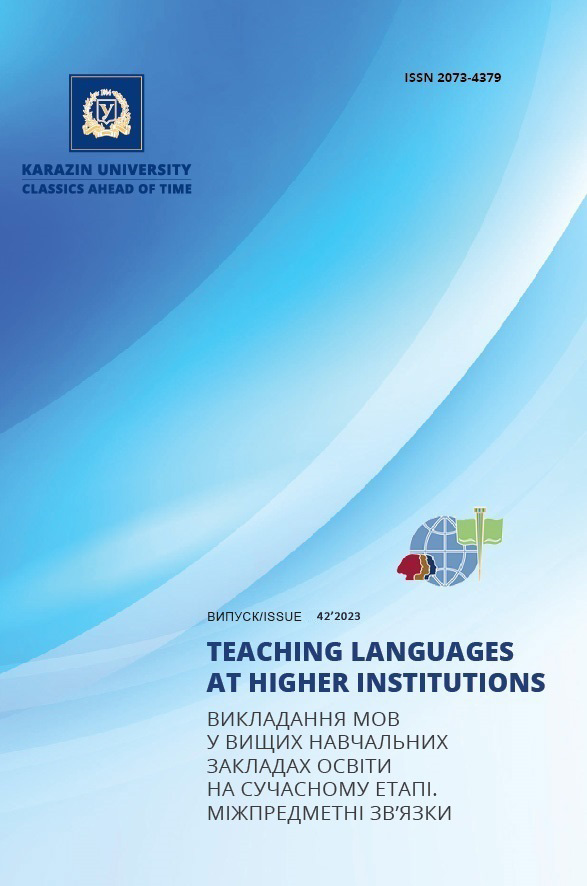Difficulties in mastering phrasal verbs in professional English
Abstract
The article deals with the issue of the usage of phrasal verbs in professional English. First, profound knowledge of modern English is impossible without a confident command of phrasal verbs. Secondly, phrasal verbs are among the most used verbs in everyday colloquial speech and it is impossible to imagine modern English without them. One of the predominant features of phrasal verbs is that the meaning of the same verb can change beyond recognition or become opposite in combination with different postpositions. Precisely because of this, the purpose of the research is connected with the identification of challenges encountered in mastering phrasal verbs due to these combinations functioning not only at the everyday level but also as a full-fledged component of the language ofprofessional communication. This suggests that the semantic relationships between the parts of phrasal verbs are crucial. To achieve the set goal, the following methods of teaching were applied: descriptive (for a general description of the context of a phrasal verb in English); contextual-interpretive (to identify the functional and semantic meaning of a phrasal verb), as well as a method of creating a problem situation using a phrasal verb.
The author highlights the main features of phrasal verbs that cause difficulties in learning English, considers lexico-semantic variants of phrasal verbs presented in modern phraseological dictionaries; gives some examples of professionally oriented phrasal verbs in modern English and the reasons for their appearance. It has been proved that modern English is difficult to imagine without them owing to their specificity, diversity of the context, and semantic relationships between the parts of phrasal verbs. The same can be said about their polysemy, variety, and idiomaticity. Such popularity of phrasal verbs is explained by their semantic brevity and informativeness. They can be a highly productive means of language economy. The functioning of phrasal verbs is directly related to the mobility of these language combinations, and their ability to acquire new and transform existing lexical meanings for their expansion to new concepts and phenomena. In turn, scientific and methodical bases of using phrasal verbs in the appropriate professional English context will serve as a perspective for further research.
Downloads
References
Vorobjova, О.S. (2019). Phrasal verbs in English: derivation and translation. Zakarpatski filologichni studiyi [Transcarpathian philological Studies]. Uzhgorod, 10 (2), pp. 41–45. DOI: https://doi.org/10.32782/tps2663-4880/2019.10-2.8 [in Ukrainian].
Dido, N.D. (2016). Do pytannya vyvchennya frazovyx diyesliv v anglijskij movi [On the question of studying phrasal verbs in English]. Suchasni doslidzhennya z inozemnoyi filologiyi [Modern Studies in Foreign Philology]. Uzhgorod, no 14., pp. 34–39 [in Ukrainian].
Kato Lomb. (2016). Kak ja izuchaju jazyki. Zametki poliglota [How I Study Languages. Polyglotʼs notes]. Lichnoe razvitie [Personal Development]. Izd-vo Mann, Ivanov i Feber [in Russian].
Cambridge Free English Dictionary and Thesaurus. Available at: https: //dictionary. cambridge.org/ [Accessed 19 Sep. 2019].
Macepura, L.L., Andryuxina, І.О. (2020). The Peculiarities of Using Phrasal Verbs of English. Current Issues of Philology and Methods of Language Teaching: All-Ukrainian Science and Practice Internet Conf., Dedicated on the 90th Anniversary of the Establishment of the KSPU and on the 25th Anniversary of the Foreign Languages. Kryvyj Rig, September 29-30, 2020. Ed. 3 (15), P. 1, pp. 112–118. DOI: https://doi.org/10.31812/123456789/5989 [in Ukrainian].
Phrasal verbs of the English Language. Available at: https: //opentalk.org.ua/langstory/frazovi-diieslova-angliiskoi-movi/ [Accessed 13 June 2018] [in Ukrainian].
Huzhanov, Ymid Tadzhievich. (2022). The history of lexicology. International Conference on Developments in Education. E Conference Zone. Hosted from Toronto, Canada. Pp. 108–112. Available at: https://econferencezone.org/index.php/ecz/article/view/1513 [Accessed 01 Jan. 2023] [in Russian].
Chaenkova, O.K. (2019). Linguocultural specificity of phraseological units in translating process (on the material of Ukrainian, Turkish, and English languages). Language. Scientific and Theoretical Journal. No 31., pp. 41–54. DOI: https://doi.org/10.18524/2307-4558.2019.31.178520 [in Ukrainian].
Yanchuk, О.S., Zaluzhna, О.О. (2021). The Linguistic Status of Phrasal Verbs in the Modern Paradigm of the English Language. Bulletin of the Student Scientific Society of Donetsk National University named after Vasyl Stus. Vinnitsa. Vol. 1 (13), pp. 197–200 [in Ukrainian].
Mc. Arthur T. Phrasal Verb. Available at: https://www.encyclopedia.com/topic/PHRASAL.VERB.aspx [Accessed 13 June 2018].
Smith, L.P. (1928). Words and Idioms: Studies in the English Language. London. Constable.

